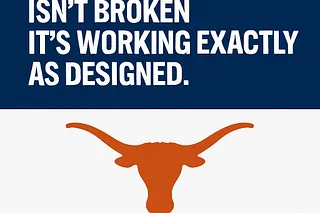My daughter didn't get into the University of Texas. She had the grades. She had the scores. She had the extracurriculars.
But she didn't get in.
A few weeks later, we learned some interesting facts about who did:
- •Legacy admits with lower scores
- •Out-of-state students paying premium tuition
- •Athletes in sports you've never heard of
That's when it hit me: The system isn't failing. It's operating according to its actual design. And that design isn't about merit at all.
The Merit Myth
We tell our children a comforting story: Work hard. Get good grades. Build a strong resume. The system will reward you.
It's a lie.
Not because merit doesn't matter—but because the systems we've built pay lip service to merit while serving very different masters:
- •Prestige over performance
- •Connections over competence
- •Fundraising over education
This isn't conspiracy. It's business as usual.
Beyond Academia: The Pattern Everywhere
This pattern extends far beyond college admissions. I've seen it in:
- •Hiring processes that favor pedigree over potential
- •Promotion systems that reward visibility over value
- •Funding models that amplify existing advantages
- •Regulatory regimes that protect established players
The common thread? Systems that claim to be about merit but are actually about maintaining power structures.
Technical Meritocracy vs. Systemic Reality
In my operations career, I've experienced both sides of this divide:
At the technical level, merit often does rule. The warehouse doesn't care where you went to school—it cares if the packages move efficiently.
But at the systemic level? The rules change. It becomes about:
- •Who you know
- •Where you're from
- •Which language you speak (both literally and culturally)
- •Whether you fit the unwritten template
And the most insidious part? The people who benefit most from this system are convinced they've earned it all through pure merit.
The Real Damage
When we pretend our systems are purely meritocratic when they're not, we create a toxic brew of consequences:
- •Qualified people who never get their shot
- •Psychological damage to those who follow the rules and still lose
- •Cynicism that erodes social trust
- •Protected mediocrity in our institutions
- •A society that wastes its most precious resource: human potential
My daughter will be fine. She's going to a different school. But what about the millions of Americans who work hard, play by the rules, and still can't break through?
Fixing the System, Not Just Criticizing It
The solution isn't to abandon meritocracy—it's to actually implement it. Here's what that looks like:
1. Radical Transparency in Selection
Every selective institution—from colleges to corporate hiring—should publish its actual decision criteria, not just its stated values.
2. Algorithmic Accountability
When AI and algorithms make decisions, they should be auditable for bias and available for public review.
3. Performance Over Pedigree
Whether in education, hiring, or promotion, we need systems that measure what you can do, not where you came from.
4. Multiple Paths to Success
A truly meritocratic system doesn't just have one narrow definition of "merit"—it recognizes excellence in many forms.
5. Equal Enforcement of Rules
When rules are bent for some but strictly enforced for others, merit becomes meaningless.
Why This Matters for My Campaign
I'm running for Congress because I believe American institutions should work for all Americans—not just the connected few.
This isn't about left vs. right. It's about whether we actually believe in the ideals we claim to cherish:
- •That hard work should be rewarded
- •That the best ideas should win
- •That your zip code shouldn't determine your future
My daughter's rejection letter was more than a personal disappointment. It was a reminder that the systems we've built often betray our stated values.
In Congress, I'll work to align our institutions with our ideals—to build systems that truly reward merit, create opportunity, and allow every American to rise as far as their talent and hard work can take them.
Not because it's easy. But because it's the country we promised to be.

